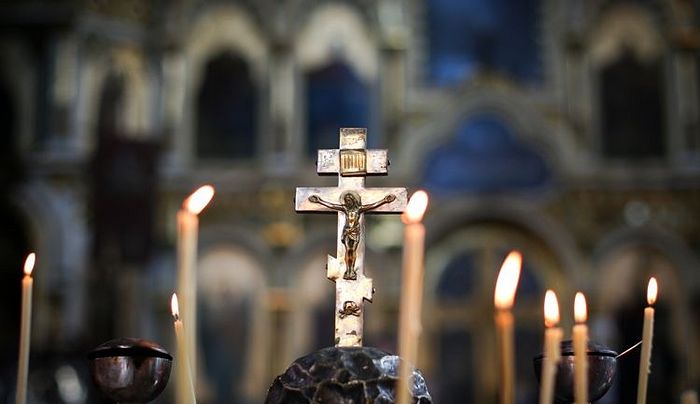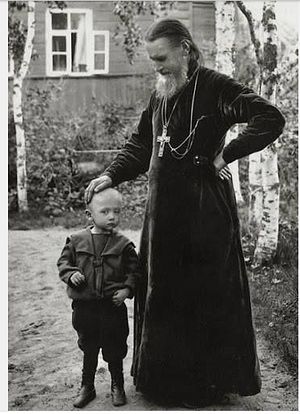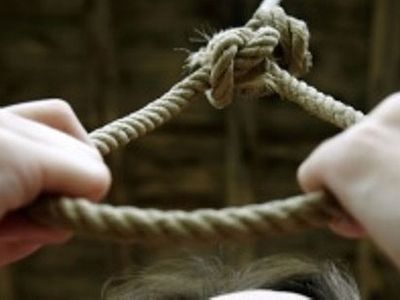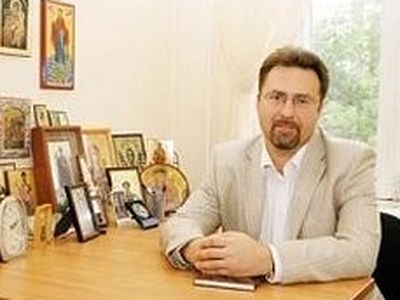The near total ignorance of the sin of suicide among contemporary young people is shocking. "You mean it's a sin to kill yourself? I can understand about killing someone else, but life now is so difficult and ugly.”
These are the thoughtless words of the young. One young woman who had been beset with grief recently admitted to me: "I wanted to poison myself. I have no one particularly near or dear to me on this earth. I just wanted to go be with my mother and my sister who died of tuberculosis at an early age. She was like an angel." I replied: "After committing the terrible sin of suicide were you really expecting to meet your deeply religious mother who patiently bore her cross to the end of her life, and your meek, angelic sister in the next life and to be with them in that blessed place?"
"But I didn't know that suicide was a great sin."
"Didn't they explain the gravity of that sin to you in school, in your catechism class?"
"Believe it or not, they didn't. Or else maybe they did explain it in passing, but if so they did it so unconvincingly that, as you see, I didn't remember it."
Others simply say "Surely you don't think that if a person cannot bear the pain of living and kills himself that God will punish him severely for that? You monastics imagine God as some kind of disciplinarian. The Lord is immeasurably kind." Such are the inexperienced thoughts of the young. One young woman, a believer, admitted to me that on several occasions she planned to kill herself without giving a thought to the fact that by killing her body, she would be handing her soul over unspeakable torment. One woman told me "When I was eight years old a young officer poisoned himself with morphine right before my eyes. First he made the sign of the Cross many times, then he began to take the doses of morphine powder very quickly, one after another. His behavior seemed very strange to me and so I asked him 'Serge, what are you doing?' 'I have a terrible headache and I'm taking the powder for my migraine,' answered the young officer." The girl believed him and a few minutes later Serge fell asleep forever.
One young man was found shot to death by his own hand in front of an icon lamp he had just lit.
One officer of the Volunteer (White) Army shot himself over an open Gospel book. I knew him personally in Kuban in 1918. He was a modest, quiet, religious young man, twenty-one years of age.
It is somewhat possible to comprehend irreligious suicide, motivated by insanity or by haughty rejection of God. But many believing people commit suicide out of ignorance. They often say "If I killed myself, I wouldn't be doing any harm to anyone else. No one would mourn my passing." But what about to yourself? To your eternal soul?
"How do you know? I believe in 'the world to come,' but no one knows how souls fare there or what state they are in. No one has ever been in the world to come."
And so I am obliged to explain that I know, and know for certain, that it is extremely bad for the souls of suicides "over there." Perhaps it was so that I could write these words for the benefit of young people and people in general who do not understand the gravity of the sin of suicide that the Lord revealed to me certain things, including the very grave spiritual condition of those souls.
I can relate the following: about ten years ago a nun of our convent, Mother A., told me about the tragic death of her relative, the daughter of her husband's sister, who killed herself back in Saint Petersburg. Marina (that was her name) was mentally unstable and had a bad family history (her father was an alcoholic). Marina was given to fits of extreme melancholy. Marriage did not change this. About two weeks before killing herself she came to visit her aunt, now Mother A. (at that time Mother A. was still living in the world). Her aunt was planning to leave for Moscow to visit her sister. Marina said to her "Auntie, when you return, I won't be alive anymore."
"What do you mean?" said her aunt in amazement. "Are you seriously ill with some sickness?" "No, I am completely healthy, I'm just tired of living. I went to a fortune teller and she told me that I was going to live a long life. Bu I don't want to live."
Her aunt was shocked by Marina’s thoughtless, senseless words and said to her very seriously "But you recently had Confession and Holy Communion from Father Alexander (a friend of Father John of Kronstadt); how can you even think about suicide? It is a terrible sin. Take pity, if not on yourself, then on your mother—you'll kill her. She has devoted her entire life to you. She tried to bring you up in the faith. What are you going to do to her?" Marina thought for a moment and then quickly said "Yes, you're right, you're right. But I'm still tired of living and so don't forget to bring lilies and roses and my poems to my grave."
Two weeks after this conversation she asked her husband to go look for a dacha for their summer vacation. As they learned later, before committing suicide she bought a book of anatomy and thoroughly studied the region of the heart. While her husband was away, Marina threw a party and assembled a group of young people at her house. In the midst of the festivities she left her guests in the living room and went to her bedroom. A few minutes later, the lighthearted young people were shocked by the sound of a sudden gunshot. They rushed to Marina's room. She was lying on the rug with a gunshot wound in her heart. Next to her on the floor lay her beloved dog Collie.
The mother of this unfortunate twenty-three year old woman who had cut short her young life suffered inexpressible pain. The deeply religious mother naturally was painfully aware of the terrible seriousness of her daughter's sin: "It was my Golgotha, my crucifixion and with all my being, with my whole heart I felt the dreadful weight of my Marina's sin," said the grief-stricken mother. "I suffered the torments of her soul in the afterlife myself and day and night thought only of how to alleviate her suffering. I went to the Optina Hermitage and asked them to serve a Panikhida for my Marina in the monastery, but they refused to do so because of the strict Church rules forbidding prayers for suicides." This refusal by the monks crushed the already grief-stricken mother. She returned to Petersburg in despair: the Church had rejected her unfortunate daughter. But the Merciful Lord inspired her to go to the holy and great intercessor for the Russian land, Father John of Kronstadt.
The grace-filled elder, full of love for the suffering, listened to the whole tale of the mother's inexpressible grief with deep compassion. Upon hearing of Marina's bad family history, he said "The poor, poor girl, may the mercy of God be upon her. I will pray for her." And thus the poor mother received some consolation from the All-Merciful Lord through the great luminary of the Russian land. The last luminary of Russia took pity on the mother who was overwhelmed with grief and understood her grief in his all-embracing soul.
After hearing Mother A.'s story, I wrote Marina's name in my book of commemoration and began to pray "May God's will be done with the handmaid of God Marina."
And so several years passed. Once, before the Midnight Office, I had an unusual dream which I will never forget. I was sleeping in a cell made from a passageway, behind a curtain. Into my cell area came a young woman, blonde, with her hair piled high on her head and very sad gray eyes; her pretty face and her entire appearance showed great sorrow. I greeted her as if I had known her for a long time: "Hello, Marina, have a seat, although I don't know where I can find a place for you to sit. How about here, on the edge of the bed?" Marina remained standing, deep in grief and in thought. "How are you, Marina?" I asked. "Why are you asking me about that?" answered a voice full of bitterness. "Surely it can’t be well with us." Marina emphasized the word "us" so that I would understand that it meant "all suicides." "You know very well how I took my own life; we are all held strictly accountable for our deeds. We all experienced the preaching of the Holy Gospel. We can never be happy or joyous." I asked "What about when you are commemorated?" (By that I meant "When they pray for you at the Proskimedia.") "Then we have to look at the house" she said. "What house?" I asked. "I can't reveal that to you... You wouldn't understand now, but later (I believe that Marina meant after death) you will learn everything."
I looked at the deeply sorrowful young woman who was standing clearly before me and thought, "What nonsense am I dreaming? It's a dream, and nothing more. How could I be seeing Marina, whom I had never known in my life? It's all nonsense. It is not possible that Marina appeared to me." And while I was thinking this, I clearly heard a stern voice above me say If they hear not Moses and the prophets, neither will they be persuaded, though one rose from the dead (Luke 16:31). These words from the Gospel were spoken not in Church Slavonic, but in Russian, as if to better instruct me. I became ashamed of my doubts and with complete faith that it was Marina standing before me I asked her "Surely it won't always be so bad with you?" I was pierced with a feeling of the hopelessness of eternal, spiritual suffering. "I don't know," came the sad answer. "Whatever God wills." Marina added fervently "Please remember, Mother B., that we are held especially strictly accountable for our deeds. We all (she pronounced the last words with emphasis) experienced the preaching of the Holy Gospel, we know what the truth is. We all (I understood her to mean: suicides who knew the Good Tidings of Christ) are judged very severely." At those last words of Marina's, I awoke. After the Midnight Office I went to Mother A. and asked, "Was Marina blonde, with her hair done up high on her head, with a pretty, round face?" "Yes, that's exactly what my unfortunate Marina looked like, but how did you know that?" she answered. And I told Mother Anastasia about my unusual dream.
We can only understand in part the dreadful spiritual torments suicides suffer. Marina had inherited a bad family situation. She was spiritually ill, but not to such an extent that she was completely unaware of what she was doing, and now she had to endure the lawful punishment for the dreadful sin of suicide.
In killing the body which was fashioned in wisdom by the Great Eternal Author of life, the suicide condemns his soul to inexpressible sorrow. Suicides are condemned as transgressors of the Law of God.
Once I learned of the death of a former officer, whom I had known from the Volunteer White Army. Right away I asked the priest of our convent to commemorate the newly departed officer for forty days. A few days after I learned of his death, we nuns were to prepare for and receive Holy Communion. After we received Holy Communion and the service ended, an elderly nun gave me a book and asked "Read us a spiritual instruction from here. I'll tell you which one." I was surprised, because after Holy Communion we never read spiritual instruction in church, but each nun read whatever instruction she felt she needed in her cell, or prayed instead. I took the book and began to read the instruction she had indicated: "My days have flown by like birds, they have wound up like a scroll, they have vanished like smoke. All my youth I spent forgetful of God, in unprofitable waste of time." As I read, I thought "And why did Mother I. choose such an inappropriate instruction for the sisters? All the communicants had come to the convent in their early youth and had spent their youth in hard labors for the Lord's sake. This instruction is appropriate for me alone.” I continued reading: "I stand before the face of the Dread Judge." I was looking at the book, of course, standing on the kliros, when I was struck by a vision, as if by lightning. I looked into the book and saw clearly as if with some other eyes: in the narthex, across from the commemoration table stood the newly departed officer, whom we were commemorating for forty days. He was standing with his head bowed low, bent over with his hands tied behind his back. He was standing like a criminal who had committed some terrible offense. I saw the newly departed for only an instant, like an ominous flash of lightning. I told my spiritual father about my vision of the soul of the newly departed one. "He has been condemned by God, as a transgressor of His law," my spiritual father answered sternly. "He must have committed some terrible sin," I thought, and I had the sudden thought "Could he have committed suicide?" I made inquiries in a letter, trying to find out the cause of the death of the newly departed. I received the answer: "He poisoned himself with veronal (or barbital)."
In his prime he had violently cut short his life, given to him according to the great mercy of the Author of the Universe. Was that officer an unbeliever? No, he both believed and did good deeds for others. He poisoned himself at a difficult moment in his life. Several years before his suicide, while sitting by the grave of his older brother, who had also committed suicide, he had said: "I sense his soul here. How could he have done such a thing? And can the Lord possibly forgive him for it?"
See then that ye walk circumspectly. This was a clear acknowledgement of the sin of suicide. It is easy to fall into the power of Satan, who can darken the mind of a believing person, lead him into a state of delirium and, at a difficult, seemingly desperate moment, make him cut short his precious life which was given to him by the Lord according to His great mercy
But of mercy and judgment will I sing to Thee О Lord. The Lord is merciful, but he is also the Righteous, Chastising Judge.
Remember, young people: suicide is one of the most dreadful of sins, and unfortunately it is very widespread in our extremely difficult times.
Father John of Kronstadt's Advice
I knew from Mother A.’s account that Father John of Kronstadt had great boldness before the Lord to intercede for certain suicides. And so I began to pray to the saint and ask on behalf of the unfortunate soul of the former officer of the White Army: "Righteous Father John, pray to God for the soul of this unfortunate suicide." And once I was reading the rule before Holy Communion for the children of our convent's orphanage on a Saturday, since the children were to receive Holy Communion the next day. During the reading of the Canon for the Departed, I prayed for my relatives and friends, and I called upon Father John of Kronstadt in prayer to ask him to pray for the unfortunate former officer of the White Army who had recently committed suicide.
I finished reading the prayer rule for the children and came out of the church when one of the nuns gave me a letter. I opened the envelope. It was from an acquaintance of mine, who wrote: "I recently became acquainted with a priest who knew our great intercessor, Father John of Kronstadt personally. This luminary of the Russian land said to my acquaintance: 'If anyone should see a departed person in a dream or while awake (the latter case is extremely rare), then he must read the Psalter or the Holy Gospel for the repose of this person for forty days. He must light at least the smallest wax candle for the repose of the soul of the departed and pray for him until the candle burns out. If a person is busy and cannot pray for long, then he may do so piecemeal, by day or by night.’"
I read these words and thought: "Great and holy was the last luminary of the Russian land, and he is near to all who call upon him."
Spiritual suicide
There is another form of suicide: killing not of the body, but of the soul. A man who falls away from the truth of the Orthodox faith commits the dreadful sin of spiritual suicide. A soul that falls away from the eternal Truth, from the Great Light of the Orthodox faith is immediately covered in darkness and becomes dead, lifeless, becomes Satan's property and his servant. He who falls away from the Church becomes estranged from the Savior of mankind and is deprived of the grace to do God's will, and instead does Satan's will. Having fallen from the path of salvation, he reaches the abyss of arrogance. Outside of the true Church, the Ark of salvation, he drowns in the ruinous waves of the sea of life. And a man destroys his soul through sins he does fails to repent of, by failing to correct his sinful life.
Nun Barbara Khopovo, October 1943
Originally published in English in Orthodox Life vol. 59, no. 4, July-August 2008







